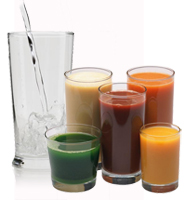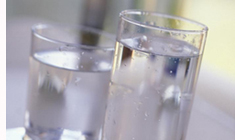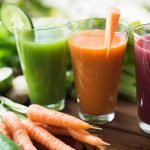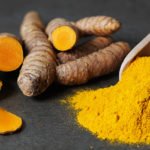So now it’s water. If you are to believe what the media has been saying over the last couple of weeks, there are no health benefits to drinking water. Drinking water or cola are pretty much the same thing. And dehydration is a myth.
Really?
No, not really. As usual, the media got the story all wrong — and, as it turns out, even the accurate story is much less than it seems. In this issue of the newsletter, we’ll see how the media once again lost the truth by attempting to reduce science to a sound bite and how research that the sound bite is based on is pretty much meaningless. Then we’ll wrap things up with a discussion of what you really need to know about water.
The media…again
 If you saw the headlines, you’re probably thinking that water is about to be pulled from the market and anyone who sold it was about to be arrested for running one of the greatest consumer scams of all time.
If you saw the headlines, you’re probably thinking that water is about to be pulled from the market and anyone who sold it was about to be arrested for running one of the greatest consumer scams of all time.
- Study pours cold water on drinking eight glasses a day
- Water Study Disproves 8 Glass Rule
- Extra water is no help, it only stretches your bladder: study
- Zero Health Benefit From Drinking Extra Water
- Need For 8 Glasses Of Water A Day ‘A Myth’ Say Researchers
- Study:Skip the Water, Have a Soda Instead
Read the headlines and there can be no mistake. A scientific study conducted by Drs. Negoianu and Goldfarb has proven that there are no health benefits to drinking 8 glasses of water a day! But there is little truth to the headlines. The media’s reporting on the “study” is wrong on a number of counts.
- First, it was not a study at all — merely a cursory examination of pre-existing scientific literature. No new ground was broken here, just a reinterpretation of older reviews and studies — only one of which specifically looked at drinking 8 glasses of water a day. The others involved indirect inference. Or to look at it another way, this report, just published in the Journal of the American Society of Nephrology, would be disallowed in a court of law as “hearsay” evidence.
- But more to the point, contrary to what the headlines say, the report in question never actually says that drinking 8 glasses of water a day provides no health benefits — merely that there is not yet any clear proof that it does. To quote, “To summarize the conclusions of other, more exhaustive reviews: There is no clear evidence of benefit from drinking increased amounts of water. Although we wish we could demolish all of the urban myths found on the Internet regarding the benefits of supplemental water ingestion, we concede there is also no clear evidence of lack of benefit. In fact, there is simply a lack of evidence in general.“
- And finally, the study never actually says that drinking soda is the same as drinking water. Yes, some of the other studies that this study refers to make that claim — but not this study. In other words, headlines above such as “Study: Skip the Water, Have a Soda Instead” are nothing more than inaccurate media sound bites.
In summary, we can throw out the headlines and stories as found in the media. Now to be fair, as advertising revenues have dropped, newspapers and television networks all over the world have dramatically cut their reporting staffs to save money — and for the most part now have to function as reporters and transcribers of news, rather than as investigative journalists. In other words, not one of the media reports actually looked beyond the press release associated with the review. That said, we’re still left with the question when it comes to drinking water, “What then did Drs. Negoianu and Goldfarb actually say in their review?”
The 8 glasses of water review
They begin their review by examining a handful of studies that support the drinking of more water and dismiss them all in a single brushstroke. To quote:
“Of course, these studies suffered from weaknesses typical of epidemiologic and retrospective case-control data: Are people sick because they drink less, or are they drinking less because they are sick?”
It seems that Negoianu and Goldfarb are starting with a fundamental premise that any existing study that supports the use of water is fundamentally flawed and should not be considered in drawing any conclusions. But they also seem to be starting with the equally questionable premise that almost any study that negates the value of drinking 8 glasses of water is correct ipso facto and should be highly valued. These are interesting assumptions since they pretty much guarantee your conclusion before you even started. With that in mind, let’s take a look at one of the studies they believe worthy of inclusion.
At the top of their list is the 2002 Valtin study that they describe as an “exceedingly thorough review of this subject.” High praise, indeed! So what exactly is this benchmark study? Well, first surprise, it’s not a study at all. Like the Negoianu and Goldfarb review, it too is a review of previous studies. And like the Negoianu and Goldfarb  review, it too is based on some “interesting” assumptions.
review, it too is based on some “interesting” assumptions.
For example, Dr. Valtin announces that just counting water intake in his review is not good enough. “The concept I have in mind is daily intake of drinking fluid (as distinct from fluid in solid food) meaning all drinking fluids, including tap water and bottled water, coffee, tea, soft drinks, milk, juices, and possibly even beer in moderation.”
Excuse me! As a study of the health benefits of drinking 8 glasses of water a day, you can pretty much toss this review out from the get-go. Not all fluids are the same. If you think so, try washing your clothes in beer and soda. But then again, perhaps it was the happy inclusion of beer and soda that led Drs. Negoianu and Goldfarb to think so highly of Valtin’s “exceedingly thorough review.”
Yes, I understand. Dr. Valtin would disagree with me. He cites the Grandjean study, which concluded that there is no significant difference between water, soda, coffee, beer, etc.when it comes to hydration. And yes, that’s possibly true if you limit your discussion to the volume of fluids entering and leaving the body; but that doesn’t mean that there’s no difference. What those liquids contain when they enter the body — and when they leave the body — are not necessarily the same for all liquids, regardless of volume. The Grandjean study, for example, didn’t consider the effects in his other “drinking fluids” of sugar (promotes diabetes), artificial sweeteners (they make you fat and give you cancer), phosphoric acid (causes osteoporosis), or caffeine (increases the risk of spontaneous abortion) on the body. Drinking water and soda are not the same thing. There really are differences in terms of health. So much for the Grandjean study.
Is there any evidence that drinking more than the minimum amount of water is beneficial?
As it turns out, there’s quite a bit. Here is just a sampling.
- The more water you drink, the less your chances of developing kidney stones
- Higher water consumption has been associated with lower rates of urinary cancer
- A relationship between high water intake and lower colon cancer risk
- A higher intake of water reduces the incidence of heart attacks
That said, Drs. Negoianu and Goldfarb were correct when they stated that there is simply a lack of evidence in general.As they and Dr. Valtin all found, there are quite simply no actual studies that focus on the overall benefits of drinking 8 glasses of water a day. All conclusions, at the moment, are based on inference from studies that were focused on other agendas — and the people doing the inferring have no understanding or affinity for the value of complementary health.
But what about the anecdotal evidence on drinking water?
However, let’s not ignore anecdotal evidence. Just because researchers haven’t proven the benefits of a particular alternative health treatment yet, doesn’t mean it’s not valid. Consider all of the fruits and plants whose benefits were touted for centuries without proof — only to be found to contain amazingly beneficial phytochemicals in the last few years. Also, consider all of the herbs used by healers since the dawn of man that ultimately became the basis for some of the worlds most powerful drugs. We’re talking about plants which became drugs such as Chinese star anise, which was the basis for Tamiflu, saw palmetto for Proscar, Pacific yew for Tamoxifen, and foxglove for Digitalis — just to name a few.
And finally, let’s not discount the anecdotal evidence of millions of people around the world who testify to better health and greater vitality when they increase their consumption of water. Even if it is a placebo effect, it’s still a positive effect, and water is a whole lot cheaper than the placebo effect achieved by “approved” medical procedures such as angioplasty or mainstream drugs such as Zetia and Vytorin.
But enough! I could go on ripping through these studies pointing out their deficiencies ad infinitum. But there’s no need; the point has been made. Time to move on and talk briefly about the quality and quantity of water you need — at least as we understand it at this time.
Not all water is the same.
To put it simply, you want the purest water you can get that also contains essential trace minerals and that is pH optimized and in a form that your body can most readily utilize. In that regard, not all water is the same.
- Avoid chlorine and chloramines in your water. They are known carcinogens and kill all beneficial bacteria.
- Avoid fluoride in your water. It makes your bones weaker, encourages the deposit of aluminum in the brain, and lowers immune levels throughout the body.
- Drink water with optimized molecular groupings to improve cellular transport. There are many ways this can be accomplished, but applying a magnetic field to the water certainly works, and it’s inexpensive. The interesting thing is that plants, which are not subject to the placebo effect, grow much better on water subjected to a magnetic field.
- Drink water that has an alkaline pH. As detailed in Chapter 13 of Lessons from the Miracle Doctors, maintaining a blood pH of around 7.45, without compromising the pH of the surrounding tissue, is vital. This requires the presence of minerals since pure distilled water has a neutral pH but turns slightly acid over time as it absorbs carbon dioxide from the air, thus forming carbonic acid.
How much water do we need?
In advanced societies, thinking that tea, coffee, alcohol, soda pop, or other forms of manufactured beverages are desirable substitutes for the purely natural water needs of the daily “stressed” body is a common, but potentially deadly, mistake. Water is the solvent in our bodies, and as such, it regulates all the functions of our bodies, including the action of all the solids dissolved in the water. In fact, every function of the body is monitored and pegged to the efficient flow of water. Think for a moment of just a few of the functions that water regulates:
- The movement of blood
- The transport of nutrients into our cells
- The movement of waste out of our cells
- The flow of lymph fluid
- The movement of nerve impulses through our nerves
- The movement of hormones throughout our bodies
- The functioning of our brains
 Understand, we can function quite well and for quite a long time without sufficient water. The body quickly adapts and starts extracting more water from your stools for example. The kidneys flush less water to retain the limited supply you have. In fact, there are some health experts who claim that your body does quite well on 2 glasses of any kind of fluid a day — plus the water found in the food you eat. But these experts confuse adaptation with health. Adaptation leads to compromise, which leads to diminished health over time.
Understand, we can function quite well and for quite a long time without sufficient water. The body quickly adapts and starts extracting more water from your stools for example. The kidneys flush less water to retain the limited supply you have. In fact, there are some health experts who claim that your body does quite well on 2 glasses of any kind of fluid a day — plus the water found in the food you eat. But these experts confuse adaptation with health. Adaptation leads to compromise, which leads to diminished health over time.
Look, ultimately it may be proven that drinking more than 2 glasses of water a day has no health benefits, but that day has not arrived yet — and the Negoianu, Goldfarb review does not bring it any closer. It’s bad science, bad reporting by the press, and shoddy peer review by the Journal of the American Society of Nephrology. Therefore, until it is actually proven otherwise, keep targeting between 64 and 96 ounces of pure water a day. Pure, fresh (not bottled or canned) fruit and vegetable juices may be substituted for some of this quantity — as may limited quantities of non-diuretic herbal teas (without sugar). In general, however, pure water is the key.
Or to paraphrase Aragorn before the gates of Mordor in the movie version of The Lord of the Rings:
The day may come when the case for drinking 8 glasses of water a day fails; when we forsake what we have known for decades and what commonsense tells us is true; but it is not this day – when science proves that water, cola, and coffee are one and the same. It is not this day!!! This day drink water! By all that you hold dear on this good earth — I bid you drink 8 glasses of pure water a day!













What are your thoughts on
What are your thoughts on coconut water? I find it difficult to drink a minimum 8 glasses of water a day (even with added lemon). I realize the importance of drinking water but need something to add to water or a healthy replacement.
Definitely as you have said
Definitely as you have said drinking more water is benificial to body. Water reserve in the body prevents dehydration.
my magnetized water is a
my magnetized water is a alkaline Ph 7.7, our blood is about Ph7.4 7 our immune system has to keep it very close to this for us to remain healthy. fizzy water is a very acidic Ph 2.6-2.8. also tea,coffee, sugar, & alcohol also red meat is acidic. So drinking 2 litres of Magnetized water a day, as much as possible on an empty stomach, to avoid stomach acids & food reducing its alkalinity,helps our immune system to keep our body healthy & gives us more energy. Most fruits & vegetables are also alkaline. Most diseases,including arthritis, gout, diabetes,Heart disease & Cancer are caused by acids stored in the tissues to prevent them getting in the alkaline blood stream. So detox the body with plenty of alkaline water. Is this the secret of better health & more energy ?
Please let me know about your
Please let me know about your magnetized water. I am interested because I suffer from gout and kidney stones and am desperate for a way to alleviate my cconditions and assist the body in the elimination process.
Thanks,